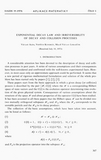Article
Full entry |
 PDF
(1.0 MB)
Feedback
PDF
(1.0 MB)
Feedback
 PDF
(1.0 MB)
Feedback
PDF
(1.0 MB)
Feedback
Summary:
It is assumed that any decay process is described in a Hilbert space $\Cal H=\oplus \Cal H_D$, where $\Cal H_A$ corresponds to an unstable particle and $\Cal H_D$ to its decay products. It is shown that the generalized Weisskopf-Wigner condition (which guarantees an exponential decay law of the given unstable particle) has a close relation to the irreversibility of decay processes as well as of collision ones described in the same space $\Cal H$. If unitarity is added the principal structure of $\Cal H$ is identical with that onwhich the scattering theory of Lax and Phillips is based.
References:
[1] Williams D. N.: Difficulty with a kinematic concept of unstable particles: the SZ.-NAGY extension and the Matthews-Salam-Zwanziger representation. Comm. Math. Phys. (1971), 21, 314-333. DOI 10.1007/BF01645753 | MR 0297273 | Zbl 0209.45102
[2] Horowitz L. P., al: The inverse decay problem. J. Math. Phys. (1971), 12, 2537-2543. DOI 10.1063/1.1665570 | MR 0290716
[3] Sinha K.: On the decay of an unstable particle. Helv. Phys. Acta (1972), 45, 619-628. MR 0418743
[4] Lax P., Phillips R. S.: Scattering theory. Academic Press, New York-London, 1967. MR 0217440 | Zbl 0214.12002
[5] Fonda L., Ghirardi G. C.: Some remarks on the origin of the deviations from the exponential decay law of an unstable particle. Nuovo Cimento (1972), 10 A, 850. MR 0307619

